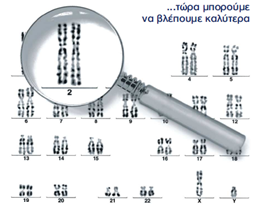Nowadays, this is performed mainly, if not exclusively, for the diagnosis of chromosomal syndromes with a typical and recognizable clinical phenotype (e.g. Down syndrome). The test is no longer indicated as a first choice in postnatal investigations of patients with mental or developmental delay, with or without multiple congenital anomalies (MCA). Today, the method of choice for these patients is the molecular karyotype (aCGH) – high resolution.
Typical indications for classic karyotype include:
- Suspicion for a known chromosomal syndrome
- Multiple congenital anomalies, with or without mental retardation
- Ambiguous genitalia
- Parents and relatives of children with a known chromosomal abnormality
It is possible that the karyotype may reveal a abnormality in the number of chromosomes, e.g. trisomy 21 – Down syndrome, abnormalities of the sex chromosomes X and Y abnormalities in all cells or in a proportion of cells (mosaicism). It is also possible that it may detect an extensive structural abnormality involving large deletions or duplications of chromosomal regions, possibly derived from a healthy parent-carrier of a balanced translocation or an inversion.
We perform high resolution karyotype analysis (RTBG, 550-850 bands) from at least 20 metaphases. In cases where mosaicism is suspected, a minimum of 100 metaphases are analyzed.
